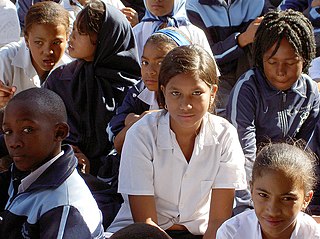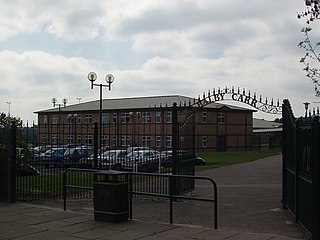Information and communications technology (ICT) is an extensional term for information technology (IT) that stresses the role of unified communications and the integration of telecommunications and computers, as well as necessary enterprise software, middleware, storage and audiovisual, that enable users to access, store, transmit, understand and manipulate information.

Educational Systems in S.A

Notre Dame Catholic High School in Sheffield, South Yorkshire, England, was established in the 1850s by the Sisters of Notre Dame, a religious order. It was, for many decades, a fee paying school. It currently has 1400 students, with a 1:17.3 Teacher: Student ratio.

Western Caspian University is a private university in Baku, Azerbaijan. Founded in 1991 by Husein Baghirov, it has six schools, 25 majors, 180 faculty and approximately 1500 students. The university took its name because it is modeled after Western universities in style of teaching and values, the latter in response to some of the corrupt practices under the Soviet system. Much of the teaching is conducted in English.

Astrea Academy Woodfields is a secondary school and sixth form located in the Balby area of Doncaster in the English county of South Yorkshire. The school operates under Astrea Academy Trust.
Alexandra Park School is a coeducational secondary school and sixth form with academy status, located in the Muswell Hill area of the London Borough of Haringey, England.
Korowa Anglican Girls' School is a private, Anglican, day school for girls, located in Glen Iris, a suburb of Melbourne, Victoria, Australia.

Chilwell School is a secondary school located in Chilwell, near Nottingham, England. The school is located adjacent to the Chilwell Olympia sports complex and has an attached sixth-form college. In January 2005, the school was designated a specialist school in Arts and Maths and Computing.

Melbourne Girls' College is a semi-selective government-funded girls’ school located in Richmond, an inner-city suburb of Melbourne. The school has one campus on the banks of the Yarra River which caters for the secondary education of girls from years 7 to 12, and has an enrolment of 1406, with a division between the middle and senior school. Currently, girls from 212 Melbourne postcodes, in Melbourne and country Victoria, along with girls from overseas countries, make up the student population. Sixty countries of birth are represented at the school.
The Self-review Framework is an online tool that schools in the United Kingdom can use to assess and benchmark their use of technology (ICT). It enables schools to identify where they are and shows the practical steps they can take to improve their use of technology. The Self-review Framework provides a structure for reviewing a school's use of technology and its impact on school improvement. It is designed to support ALL schools. It complements the work schools currently undertake for Ofsted and can be provided as evidence for a school's Self Evaluation Framework (SEF).
Derby Moor Academy, the successor school to Derby Moor Community Sports College Trust, formerly known as Derby Moor Community School, is a coeducational secondary school and sixth form situated on Moorway Lane, Littleover, Derby. It was established in January 2018 when the school converted to Academy status and joined the Spencer Academies Trust. It can also be seen as the successor to Derby School, which closed in 1989, resulting in Derby Moor opening in the same year with a new headteacher and governing body, although the buildings, pupils and most of the teaching staff were the same.
Gleeson College is a Catholic secondary school in Golden Grove, South Australia. The college is named after the late Emeritus Archbishop of Adelaide, James William Gleeson and the motto "With one heart" derives from his serving for 10 years (1971–1981) on the Pontifical Council Cor Unum.

The Westwood Academy is an academy school for children aged 11–18 in Canley, Coventry, England. Its sports centre was completed in July 2008.
St Mark's Catholic School is a co-educational Catholic secondary school and sixth form with academy status, having formerly been a voluntary aided school, situated in Hounslow, West London, England. St Mark’s is part of the Archdiocese of Westminster.

The Canterbury Academy is a co-educational 11-19 academy school in Canterbury, Kent, England. It is a specialist Sports College and 15% of its 1081 pupils are selected on musical aptitude. The school was founded as a non-selective secondary modern foundation school before gaining academy status in 2010.
Carrickfergus Learning Community (CLC) is a collaboration project between the three post-primary schools in Carrickfergus, Northern Ireland. The project aims to increase the number of subjects available to sixth-form students in the area.
Mayville High School is an independent, co-educational day school in Southsea, Portsmouth, England.

A comprehensive school, or simply a comprehensive, typically describes a secondary school for pupils aged approximately 11–16 or 11–18, that does not select its intake on the basis of academic achievement or aptitude, in contrast to a selective school system where admission is restricted on the basis of selection criteria, usually academic performance. In England and Wales comprehensive schools were introduced as state schools on an experimental basis in the 1940s and became more widespread from 1965. They may be part of a local education authority or be a self governing academy or part of a multi-academy trust.
Marine Academy Plymouth is a mixed all-through school located in the King's Tamerton area of Plymouth in the English county of Devon. The school includes a nursery, primary, secondary and sixth form section.
Information Communications Technology is usually included in the Home Economics and Livelihood Education program in grade school and taught through the Technology and Home Economics program in high school. The recent status of ICT education in the Philippines, along with other Southeast Asian countries, was surveyed by the Southeast Asian Ministers of Education Organization (SEAMEO) in 2011. Using the UNESCO model of ICT Development in Education, the countries were ranked as Emerging, Applying, Infusing or Transforming. The Philippines were ranked at the Infusing stage of integrating ICT in education, indicating that the country has integrated ICT into existing teaching, learning and administrative practices and policies. This includes components such as a national vision of ICT in education, national ICT plans and policies, complementary national ICT and education policies, professional development for teachers and school leaders, community or partnership and teaching and learning pedagogies. A 2012 study reported that public high schools in Metro Manila had a computer to student ratio of 1:63. While 88 percent of schools have internet connections, half of the students claimed not to be using it.









